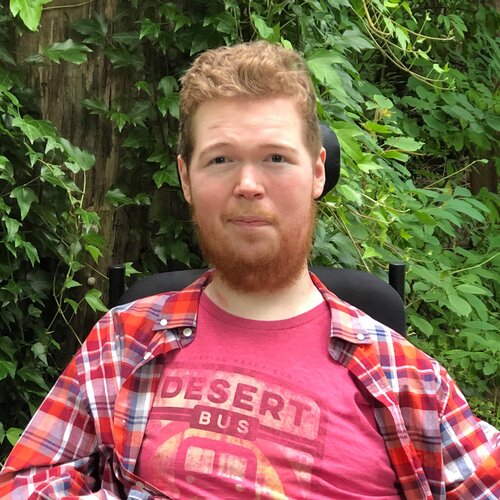Interview with Alex Carey

Every week, we meet with audience members with disabilities who are willing to come forward and share a little bit about their own personal journey and experiences, attending live, in-person, or virtual speaking or training events. Through their unique and generous perspectives, speakers, trainers, facilitators, and other communication professionals can hopefully learn about some of the things that they do well, but also (and maybe more importantly) about some of the things they could improve to provide an experience that is truly inclusive of everyone.
Meet Alex, an audience member who has a genetic neuromuscular disorder
So, without further ado, let’s dive right into this week’s interview with Alex Carey (he/him). Alex has Spinal Muscular Atrophy (SMA) Type 2, and comes to us from British Columbia, Canada.
Introductions
QUESTION 01 Can you tell us a bit about yourself, and how your disability might impact your experience, as someone who attends live in-person and virtual events?
My name is Alex and I work as a game designer and accessibility consultant. I think games are an amazing medium that has the power to foster empathy and bring positive change to the world in some tiny way. I also use a power wheelchair for mobility which has given me a unique lens to view the world. I’ve given and attended numerous talks in my life and I’ve often come away reflecting on how much energy it takes. Simply the act of actively listening can be draining on some days for me. Which is all the more reason if you’re giving a talk do your best to whisk your audience away on an auditory adventure.
Things that ruin the experience
QUESTION 02 Thinking back on some of your experiences attending in-person or virtual events, what are some of the worst things speakers, trainers, and other communication experts can do to ruin your experience as an attendee?
Some of the more frustrating talks I have listened to are the ones where the speaker doesn’t seem to care or doesn’t show passion for what they are presenting. I fully acknowledge that public speaking is challenging, but if you don’t seem to care, why should I?
Things that make a positive impact
QUESTION 03 Can you share some of the great things speakers, trainers, and other communication experts sometimes do that make a positive impact on your ability to fully enjoy your in-person or virtual event experiences?
I view presenting as a form of storytelling. Probably because some of my first exposure to expert orators was through Dungeons & Dragons. This has undoubtedly made me have a greater appreciation for presenters that make use of improv, humour and establishing seamless flow throughout a talk. If I come away from a talk not knowing what time it is because I was lost in the presentation, then I know the presenter has nailed it.
Sharing a piece of advice
QUESTION 04 If you had one piece of advice to give speakers, trainers, and other communication experts, so their content became more inclusive of people who have disabilities, what would it be?
If you have the ability to record your talk and post it online, that can be extremely beneficial for people that face barriers to travel for any number of reasons. The physical world can be challenging at the best of times, so having virtual access can be a key step in making information accessible to all.
Wrapping up
QUESTION 05 Thank you for sharing some of your insights with us today. As we wrap up our conversation, is there anything that you’d like to add, such as another thought, another piece of advice, another perspective, etc.?
If you’re presenting, try and have fun. And when inevitably something goes wrong, be it a tech glitch or a coughing fit, roll with it.
Connect with our guest on social
Interested in knowing more about our guest this week? You can follow Alex on LinkedIn and Twitter. You can also check out his website at www.alexcarey.design.

About Denis Boudreau
Denis Boudreau is a consultant, trainer, and speaker specializing in digital accessibility and disability inclusion. He works with organizational leaders who want to equip their teams with the skills to create accessible websites and digital products – so no one is left behind. A Certified Professional in Web Accessibility (CPWA), Denis has trained thousands of web professionals over the past 20+ years and delivered hundreds of workshops in both English and French. He has helped leading brands like Netflix, Salesforce, and Victoria’s Secret embed accessibility into their digital strategies, empowering them to meet legal obligations, improve user experience, and connect with more people, more effectively.
